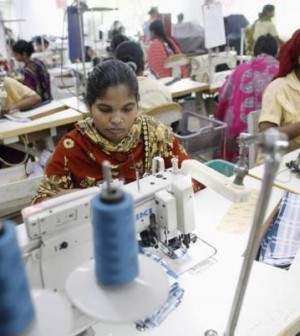- Finding Unshakable Power in a World That Wants to Pull Us ApartPosted 6 months ago
- What could a Donald Trump presidency mean for abortion rights?Posted 6 months ago
- Financial Empowerment: The Game-Changer for Women in Relationships and BeyondPosted 7 months ago
- Mental Health and Wellbeing Tips During and After PregnancyPosted 7 months ago
- Fall Renewal: Step outside your Comfort Zone & Experience Vibrant ChangePosted 7 months ago
- Women Entrepreneurs Need Support SystemsPosted 7 months ago
Jobs, better wages, less unpaid work key to making women's rights a reality: UN

Author: Thomson Reuters Foundation from trust.org
By Lisa Anderson
NEW YORK, April 27 (Thomson Reuters Foundation) – Creating more jobs for women, closing the gender pay gap and reducing the unpaid domestic work women undertake are vital to ensuring that improvements in their rights are more than just gains on paper, UN Women said in a report on Monday.
More girls are enrolling in schools and more women are working, getting elected and assuming leadership roles since the most progressive blueprint for advancing women’s rights was adopted by the United Nations in 1995.
Yet women earn on average 24 percent less than men and only half of women of working age are in the global labour force, according to the U.N. body for gender equality.
“We need to address … this complete disconnect between women’s rights on paper … and the actual outcomes on the ground. That’s where I think, globally, we’re falling very short,” said Shahra Razavi, UN Women’s data chief.
The report said introducing a minimum wage or providing social programmes, such as pensions, health benefits and childcare would make a huge difference to women.
“Many of these things are actually already happening in the real world,” Razavi told the Thomson Reuters Foundation.
One example, she said, is Brazil, which overhauled its faltering economy in the 1990s through economic and social reforms that doubled the minimum wage, simplified registration and taxes for small and medium-sized businesses, and promoted the growth of formal or salaried jobs.
As a result 17 million new jobs were created between 2001 and 2009, 10 million of which were salaried, and women’s formal labour participation increased to 58 percent from 54 percent.
“WOMEN’S WORK”
Persistent inequality is partly due to the fact that labour markets continue to channel women into gender-segregated sectors, such as clerical, childcare and elementary education jobs, which are shunned by men because wages are low and they are perceived as “women’s work,” Razavi said.
Most women, particularly those in the developing world, also continue to be burdened with unpaid domestic and care duties at home which prevent them from taking quality paid work.
Providing high quality public childcare and care for the elderly would not only help solve this, but create more jobs, Razavi noted.
She also said that investing more government resources into improving access to sanitation and clean water would help reduce women’s hours of unpaid labour.
Many women work in the informal economy without a reliable wage, health benefits or a pension to sustain them in later life.
The introduction of some form of universal health insurance, as was done in Thailand and Rwanda, and non-contributory pension plans have succeeded in a number of countries, Razavi said.
Many of these schemes have been made affordable by simply improving tax collection from citizens and multinational firms that routinely evade taxes through loopholes, she said.
The report estimated that the annual tax revenue lost to poor countries from multinationals is between $98 billion and $106 billion.
The report doesn’t give “a magic bullet solution,” but some of the proposals can be applied to every country, Razavi said.
(Reporting by Lisa Anderson; Editing by Katie Nguyen)






